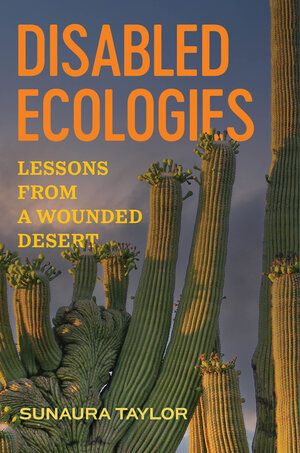Environment
Novel Ways to Understand and Rehabilitate a Disabled Planet
Dr. Sunaura Taylor's book "Disabled Ecologies" offers many unique perspectives.
Posted June 23, 2024 Reviewed by Abigail Fagan
Key points
- Many layers of disabilities come to the fore when considering how we have destroyed our one and only home.
- Disabled ecologies have impacted the lives of millions of animals in nature and in laboratory studies.
- Disability is an urgent and necessary part of the environmental arena.
Some years ago, I read an excellent book by renowned ecologist Paul Ehrlich titled Healing the Planet: Strategies for Resolving the Environmental Crisis. At the time I never had thought of using the word "healing" to refer to the significant negative effects humans were having on our magnificent planet and I never had thought of Earth as being a wounded or disabled organism. More recently, I learned of an excellent book by medical doctor Warren Hern called Homo Ecophagus: A Deep Diagnosis to Save the Earth and was taken in by accolades from diverse and renowned researchers and his unique physician's view—basically doing a differential diagnosis—of what we are doing to our planet and how we can change our ways from the point of view of a practicing physician. In an interview with Dr. Hern, he argued that humans have evolved cultures and adaptations that have now become malignant.

Given my interest in these two excellent books, I was thrilled to learn of a new highly acclaimed book by the University of California at Berkeley's Dr. Sunaura Taylor titled Disabled Ecologies: Lessons from a Wounded Desert in which the words "disabled" and "wounded" both appear. Given Sunaura's own disability, her views on the health of the planet and the treatment of other animals she covered in an earlier book called Beasts of Burden: Animal and Disability Liberation deserve careful attention. As a crusader for disability rights and animal protection Sunaura blends both movements into one and with the publication of Disabled Ecologies she has moved both fields forward with unique and very important perspectives on our boundless and incessant anthropogenic (human caused) damage to a fragile and wounded planet. Here's what she had to say about her beautifully written and thoughtful new book.
Marc Bekoff: Why did you write Disabled Ecologies?
Sunaura Taylor: There are some books that one just always know they are going to write. You may not really know what the book will end up being, but somehow, some part of it has always been there ready to emerge. For me, Disabled Ecologies is that book. There are two reasons for this. The most obvious is that this book tells the story of defense industry contamination that I grew up understanding was likely the cause of my own disability. While I always wanted to return to this history and learn more about what happened, what led me to want to write about it was that this story fundamentally formed my perception of two personal obsessions: nature and disability.
While my own story and connection to the site became somewhat more complicated as I was researching for the book, the central lessons that I learned as a child hearing about this pollution—that disability is political, collective, and ecological; and that injury to the environment is inseparable from injury to human beings—became all the more vital and relevant.1
MB: Who do you hope to reach with your book?
ST: One of the misconceptions about disability is that it is only relevant or of interest to people who have an obvious disability, like using a wheelchair or blindness. But disability is a life experience and political issue that impacts everyone. If we live long enough we all age into disability; we all move in and out of disability and illness throughout our lives. But also, disability and the presumed normalness of ablebodiedness, shape our worlds in profound and expansive ways. And of course environmental destruction impacts us all as well—there is no one who is untouched by the disablement of nature at this point. No one who is untouched by environmental injustice (though some are profoundly more likely to be directly harmed by it than others). These issues impact everyone, and so this book is for everyone.
MB: What are some of the major topics you consider?
ST: Disabled Ecologies makes the case that disability is a really important concept to understand in this moment of extreme environmental crisis that we are in. The second thing that this book does is that it tells the story of pollution and groundwater contamination on the south side of Tucson in the 1980s. This is a story about a largely Mexican-American community that faced the impacts of defense industry contamination from Hughes Aircraft Company and years of racist accusations that the contamination was their own fault. This is the first time that this history has ever been told in a book and I’m really excited to share this story because they were a profoundly successful early environmental justice movement.
The larger conclusions I draw from that story are that we need to think about the health of communities as absolutely inseparable from the health of our environments. We see all of these environmental disasters happening that are major public health crises. And yet we are so used to thinking about health as something that impacts human beings, and environmental remediation as something else. Disabled Ecologies makes the case that actually our health is absolutely entangled with the health of nature and that our responses to these issues need to be entangled as well.
MB: How does your book differ from others that are concerned with some of the same general topics?
ST: Disabled Ecologies follows in a long line of other related and entangled interventions: feminist ecologies, queer ecologies, Black ecologies, Indigenous ecologies—interventions that name social formation and power relations as central to how we think about, experience, and relate to nature and environmentalism. What I bring to the conversation is the idea that disability is an urgent and necessary part of the environmental arena. There is a small but growing amount of work that is bringing disability into the environmental conversation, but it is still a very new field. One of the goals of this book is simply to plant more seeds for this field to grow. In this age of disability—this period of increasing ecological injury from the climate crisis and extinction—it’s more important than ever to ask what our disabled multispecies world needs to survive, and critical disability perspectives are essential for that.
MB: Are you hopeful that with your book people will learn more about the importance of critical disability studies and multispecies justice?
ST: I’m very excited to see how Disabled Ecologies might reframe the conversation around disability and environmental studies, and I look forward to seeing what comes out of that. Whether we want to talk about it or not, whether we are ready for it or not, disability is going to be an increasing part of our environmental reality. My hope is that this book can help give us a language and politics to begin grappling with this fact.





